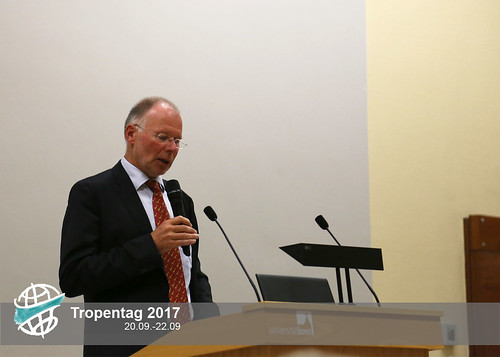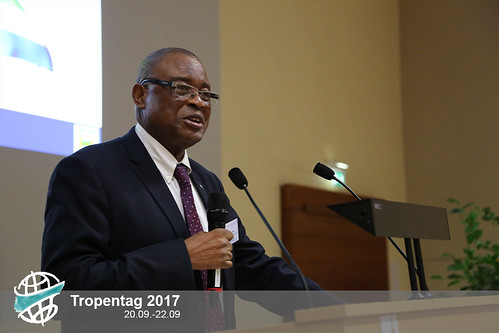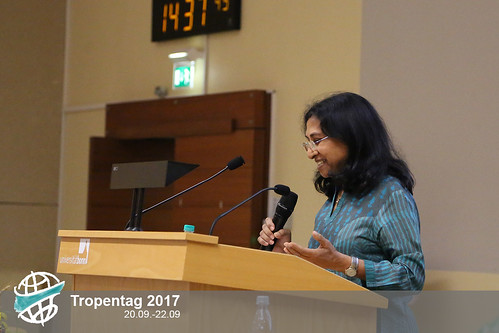Keynote Speeches 2017

“Smallscale Organic Agriculture is a Niche”
Mon, 10/02/2017 - 16:17 — marlemke“Small-scale organic agriculture is a niche” said Hans-Joachim Preuß, the managing director of GIZ, the largest development aid agency in Germany. Apparently, the future of development is large-scale industrial agriculture and big investment, according to the agenda of GIZ. “Smallscale organic agriculture won’t save the world”, said Hans Braun, director of the CGIAR Research Program on Wheat at CIMMYT, a research and training institution focused on wheat and maize. I wondered, what happened to sustainable agriculture?

The excitement and expectations of the participants of Tropentag about this year’s theme “Future Agriculture: Social-ecological transitions and bio-cultural shifts” didn't flag and were mostly met throughout the week, at least until the last two keynote speakers. Braun suggested further intensification of grain cultivation, as well as greater collaboration with the GIZ. Braun’s statements were reinforced by Preuß, who said organic products were to “only" address a “niche market”.
Rethinking the Way We Farm
Fri, 09/22/2017 - 10:04 — mustamin.fadliKeynote speaker Bina Agarwal, Professor of Development Economics and Environment at the Global Development Institute, University of Manchester, elaborates on the three areas, or pillars, any pathway towards a future agriculture needs to address. In the first video, Professor Agarwal provides an overview of her three pillars, technology, ecology, and institutions.
In the second video, she describes in more detail group farming as a promising institutional innovation.
ICRAF on Improving Agroforestry Farming Systems
Fri, 09/22/2017 - 10:01 — mustamin.fadliHow to Engage Young People in Agriculture?
Fri, 09/22/2017 - 09:46 — mustamin.fadliICRAF presents: Trees as a means of land restoration
Wed, 09/20/2017 - 22:51 — giulia.rotanodariSoil, soil everywhere, but not a spot to plant.
Land degradation is an important global environmental issue in the 21st century and is having a huge impact on agricultural productivity, food security and livelihoods. Moreover, as Tony Simmons, director general of the World Agroforestry Centre (ICRAF) stated, economic losses from it account for a loss of $10.6 trillions a year.

Future Agriculture in Africa: Challenging but Hopeful
Wed, 09/20/2017 - 17:09 — Hana KhanhWith an interesting background as both a plant breeder and politician, minister of Agriculture, Forestry and Food Security of Sierra Leone, Monty Jones talked about challenges in African agriculture but with great belief in the next generation of researchers.
He shared with the audience his memory of witnessing riots over rice shortages when he was in secondary school. This experience was what pushed him to become a researcher, and ultimately creator of ‘"the New Rice for Africa (NERICA)’’. It is used all across Africa currently, and Monty Jones won the World Food Price in 2004. He is now a minister of Sierra Leone. Using himself as an example, he encouraged the young researchers in agriculture, "HOPE and DETERMINATION will take you very far’’.
In his speech, he gave a brief picture of the existing obstacles that Africa is facing in agriculture, such as underutilization of arable lands, roughly 40% of it is uncultivated, low use of technology, climate change, poor market infrastructure, and the challenges of urbanization. However, with an optimistic perspective on African agriculture, he mentioned many ways to overcome these challenges.
The Future (of Ag) is female (Cooperation)
Wed, 09/20/2017 - 16:51 — megreslerFollowing a series of male speakers, leading expert Professor Agarwal guided her audience in considering alternative pathways forward in the future of agriculture. "We cannot wait for technological fixes… we need institutions based and built upon farmer cooperation," emphasized Professor Agarwal in her keynote address.
Referring to group farming cooperatives and joint liability groups as solutions, this poet and policy advocate highlighted some of the widely-discussed topics within the field of agroecology: the feminization of agriculture as a global phenomenon, the changes it will bring, and ways to increase productivity without sacrificing social inclusion.
I had a personal desire for Professor Agarwal to have gone one step further in her talk. Integrating group farming cooperatives drastically enhance productivity along with equity in smallholder agroecosystems in the Global South. However, what we need now are clear and developed movement towards implementation. She played it safe, when her speech could have been a fire starter, to spark discussion.

Food for Thought: The Welcome Addresses
Wed, 09/20/2017 - 16:21 — marlemkeIt’s the 19th international conference since 1999, and over 1,000 registered participants from over 68 countries assembled to discuss our vision of a new path for agriculture, while still providing for the growing world population.
The inaugural speaker, Professor Mathias Becker from University of Bonn, emphasized the crucial role of young scientists and journalists, giving special thanks to us student reporters, who” link the world outside with the Tropentag conference”.
In accordance with the representative of the German Minister of Economic cooperation and Development, both acknowledged the massive deprivation of natural resources from intensive agriculture, e. g. deforestation, big monocultures and pesticide use. They also both mentioned that feeding the soaring demand for food, even while arable land was limited, would require intensification.
Can intensification be the only answer and solution? No, nor can CRISPR/Cas9 be, said Michael Hoch, Rector of the University of Bonn. He had further questions, what role does modern biotechnology play? How can small-scale farmers in South Asia and Sub-Saharan Africa be considered as a key factor to considerably change agricultural output? In contrast to keynote speaker Monty Jones, the minister of agriculture of Sierra Leone, the welcome speakers were less certain about how to feed the world in the future.






